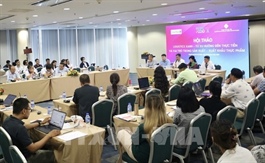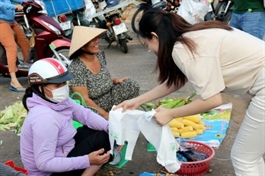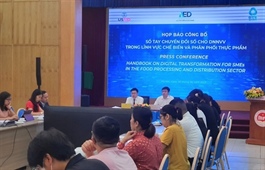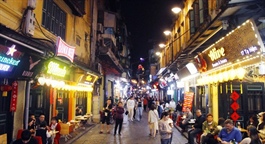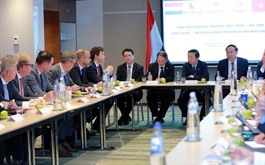No time to waste in the fight against deforestation
No time to waste in the fight against deforestation
Viet Nam is ready to enlist as an ally in the EU's fight against deforestation to showcase its dedication to environmental responsibility.
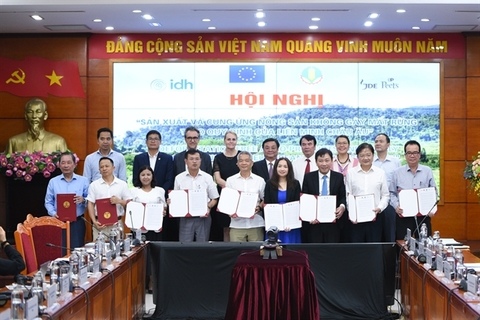
Representatives from MARD, VICOFA, IDH, JDE Peets, and five provinces sign an MOU at the conference. — Photo courtesy of IDH |
That was the remark made by Le Minh Hoan, Minister of Agriculture and Rural Development (MARD), at a conference regarding deforestation-free coffee production and supply in compliance with EU regulations on Thursday.
He said the landmark EU deforestation regulation (EUDR), formally adopted on May 16, would pose new challenges to Vietnamese smallholder farmers in regard to due diligence procedures.
However, the ministry will reiterate the urgent need for a change in agricultural practices and assist them in every step to comply with the new regulations. A plan of action has been submitted to the Prime Minister to that end.
"Green growth is not a slogan but a moral obligation. It's time to take environmental responsibilities seriously," Hoan said.
At the end of his speech, the minister called for the EU's financial support and knowledge-sharing programmes to help the Vietnamese agricultural sector come up to scratch regarding EU standards.
Florika Fink-Hooijer, Director-General of the Directorate-General for Environment, European Commission, said the vital functions that forests provide could be lost forever if human beings fail to properly protect against deforestation.
The major aims of EUDR, accordingly, are to grow forest-friendly supply chains across the globe and to boost the demand for sustainably-produced products. Any company that places its products on the European market has an obligation to ensure its products are did not cause deforestation in their production.
"I'm really happy to see that Viet Nam shares this high ambition on biodiversity and climate," Florika Fink-Hooijer said.
As supply chains are complex for certain commodities, the EU would like to fit countries embarking on the sustainable approach with technology, risk information, and guidance. Sustainable production, she said, would be a triple-win for businesses, consumers, and the planet.
Helge Elisabeth Zeitler, Deputy Head of the Unit DG Environment, in the European Commission, said the EUDR would become applicable as of December 31, 2024, but there would be additional six months for small-sized enterprises.
About €2.3 billion of Vietnamese exports would fall under its scope, with coffee, timber, and rubber being the staples. Producers having doubts about whether their products are within its purview could look at its annex to check whether their codes are covered by the section.
"We start with seven commodities and a list of products in the annex. We will look at them again regularly to make sure they can be adapted to the latest trends in deforestation," Helge Elisabeth Zeitler said.
She also said there would be a benchmarking system assigning risk levels to countries or regions according to their risk of deforestation. All countries would begin with standard levels by default, and be assigned lower or higher based on data gathered.
It is important to keep in mind that a high-risk status will not result in any higher due diligence obligation. It just means that the EU authorities will keep a closer watch on it and conduct some more inspections.
Tran Quynh Chi, Regional Director, Asian Landscapes, IDH, called for Viet Nam to have a say in the development of the EU's benchmarking system to avoid any discrepancy in their risk assessment reports.
"Different approaches yield different results. The deforestation risk linked to Vietnamese coffee when assessed by a global heavyweight was only half that when assessed by the Global Forest Watch," Chi said.
The director also called for the development of a forestry database being built on satellite imagery and reports prepared by companies. The database would provide a digital ground for mapping forest structural parameters and the delineation of natural forests, production forests, and agricultural farms.
She suggested two models for the control of traceability: the mass balance model for coffee sourced from low- and standard-risk areas and the segregation model for high-risk areas. The landscape approach was also brought up to ensure no farmers be left behind.
Under the new regulation, deforestation-free products are defined as those produced on land that was not subject to deforestation after December 31, 2020.
Nguyen Do Anh Tuan, Director of the International Cooperation Department, MARD, put forward a five-pillar action plan to help the Vietnamese agricultural sector comply with the regulation.
The five pillars are the public-private partnership (PPP), communication, technical solutions, dialogues, and resource mobilisation.
"PPP will play a vital role in the country's effort to fight deforestation, given the predominance of smallholders in the sector," Tuan said.
VICOFA President Nguyen Nam Hai told Viet Nam News that the area of land reclaimed before the cut-off date for coffee production was about 680,000ha, whereas almost no land was deforested after the date for coffee growing.
"VICOFA is calling on stakeholders to support coffee companies in covering the costs associated with traceability requirements," Hai said.



